A landmark Supreme Court ruling that the definition of a woman relates to ‘biological sex’ has cleared up a 15-year ‘legal ambiguity’ for employers and will have major implications around single-sex spaces, experts told MailOnline today.
The case tested legally for the first time whether or not somebody with a Gender Recognition Certificate (GRC) recognising their gender as female should be treated as a woman, meaning they would gain the legal right to enter women’s single-sex spaces.
With its ruling, the UK’s highest court has decided that the process of awarding of a GRC does not turn a man into a woman for ‘all purposes’, meaning they do not also get specific protections for biological women contained in the Equality Act 2010.
Gender-critical activists argued that if the Supreme Court found against them it would render the definition of ‘woman’ in the Equality Act meaningless and would undermine women-only spaces including women’s prisons and changing rooms.
The decision, which will affect millions of women across the UK, provides clarity and protection to employers who were at risk of being sued over discrimination by trans women using women’s single-sex spaces, employment experts said today.
But its impacts should be, legally at least, limited for trans people, who are already protected by the Equality Act as gender reassignment is a protected characteristic as the court made clear today.
Experts said hospital wards, employers, single-sex clubs and associations will be able to operate clearly and lawfully without challenge from trans people.
Summarising the far-reaching implications, one MailOnline: ‘The Supreme Court ruling is clearing up a legal ambiguity which has been present in the law for the last 15 years… This ruling makes it legal for any space that wants to be single sex to exclude biological men.’
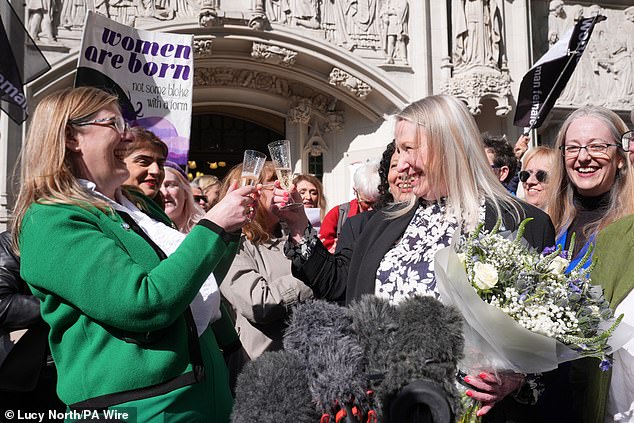
The judgement was celebrated by women’s rights groups who opened a bottle of champagne. Pictured: Susan Smith (centre left), Marion Calder (centre right) and Helen Joyce (right)
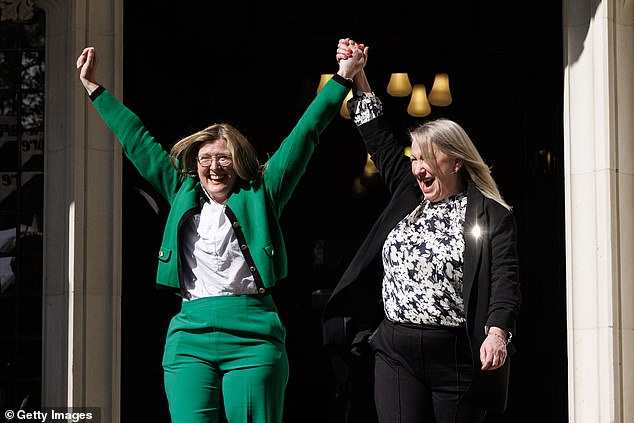
For Women Scotland directors Susan Smith (left) and Marion Calder (right) celebrate the landmark ruling
What did the Supreme Court rule?
The Supreme Court ruled the terms ‘woman’ and ‘sex’ in the Equality Act 2010 refer to a biological woman and biological sex.
Campaign group For Women Scotland (FWS) brought a series of challenges – including to the UK’s highest court – over the definition of ‘woman’ in Scottish legislation mandating 50 percent female representation on public boards.
The dispute centres on whether someone with a gender recognition certificate (GRC) recognising their gender as female should be treated as a woman under the UK 2010 Equality Act.
FWS has previously said not tying the definition of sex to its ‘ordinary meaning’ could have far-reaching consequences for sex-based rights, as well as ‘everyday single-sex services’ like toilets and hospital wards.
However, lawyers for the Scottish Government told the Supreme Court at a hearing in November that a person with a GRC is ‘recognised in law’ as having changed sex.
In a ruling on Wednesday, justices at the UK’s highest court unanimously ruled in FWS’s favour, finding that a GRC does not change a trans person’s legal sex under the Equality Act.
Lord Hodge, sitting with Lords Reed and Lloyd-Jones alongside Ladies Rose and Simler, said the ‘central question’ is how the words ‘woman’ and ‘sex’ are defined in the 2010 legislation.
He continued: ‘The terms woman and sex in the Equality Act 2010 refer to a biological woman and biological sex.’
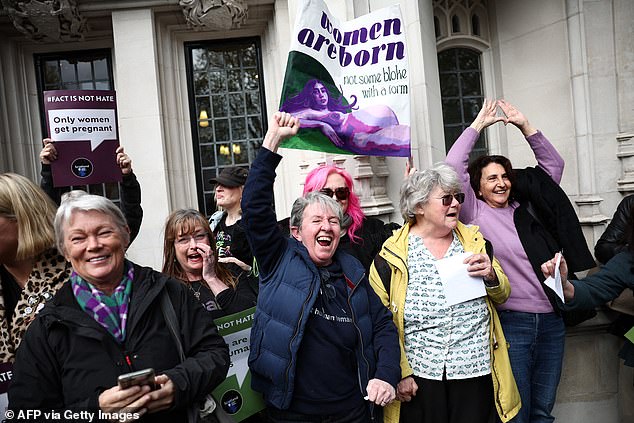
The Supreme Court has announced that the definition of a woman is based on biological sex in a landmark ruling. Pictured: Campaign group For Women Scotland celebrating the judgement
What does it mean for single sex spaces?
The court’s decision will have huge consequences for how single-sex spaces and services operate across the UK.
The written Supreme Court judgment gives examples including rape or domestic violence counselling, refuges, rape crisis centres, female-only hospital wards and changing rooms.
The court ruled that trans women with a gender recognition certificate can be excluded from single-sex spaces if ‘proportionate’.
Lord Hodge, Lady Rose and Lady Simler said that while the word ‘biological’ does not appear in the definition of man or woman in the Equality Act, ‘the ordinary meaning of those plain and unambiguous words corresponds with the biological characteristics that make an individual a man or a woman’.
The justices, supported by Lords Reed and Lloyd-Jones, later said that if ‘sex’ did not only mean biological sex in the 2010 legislation, providers of single-sex spaces including changing rooms, homeless hostels and medical services would face ‘practical difficulties’.
They said: ‘If as a matter of law, a service provider is required to provide services previously limited to women also to trans women with a GRC, even if they present as biological men, it is difficult to see how they can then justify refusing to provide those services also to biological men and who also look like biological men.’
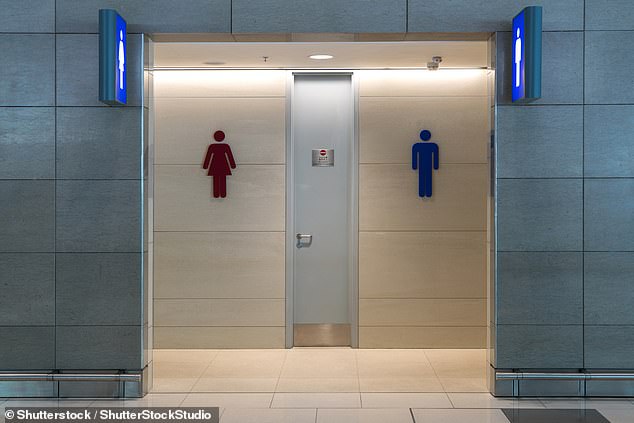
The judgement could have far-reaching implications on how sex-based rights apply, including how women-only spaces are allowed to operate
The justices added: ‘Read fairly and in context, the provisions relating to single-sex services can only be interpreted by reference to biological sex.’
They later said that while there were ‘carve-outs’ in the Equality Act for single sex spaces which permit what would usually be seen as gender reassignment discrimination, there was no similar exception for people with a GRC.
‘The intention must have been to allow for the exclusion of those with the protected characteristic of gender reassignment, regardless of the possession of a GRC, in order to maintain the provision of single or separate services for women and men as distinct groups in appropriate circumstances,’ the justices continued.
The justices said that if sex had its ‘biological meaning’ then service providers could separate male and female users into different groups, such as separate hostels for homeless people.
They added: ‘If sex means biological sex, then provided it is proportionate, the female only nature of the service … would permit the exclusion of all males including males living in the female gender regardless of GRC status.’
Obtaining a GRC requires a diagnosis of gender dysphoria, having lived in the acquired gender for at least two years and an intention to live in that gender for the rest of the applicant’s life.
Following the decision, a UK Government spokesman said: ‘We have always supported the protection of single-sex spaces based on biological sex.
‘This ruling brings clarity and confidence, for women and service providers such as hospitals, refuges, and sports clubs.
‘Single-sex spaces are protected in law and will always be protected by this Government.’
What does it mean for employers?
Experts unanimously told MailOnline today that the landmark ruling will provide greater clarity for employers on issues surrounding women’s only spaces.
Lara Brown, senior Research Fellow in the Culture and Identity Unit at Policy Exchange, said the Supreme Court ruling that found biological men are not female is ‘very significant’.
She said a trans woman with a GRC who is excluded from single-sex spaces cannot say she is being discriminated against as a woman.
Speaking of the implications, Ms Brown said: ‘It now means that women are able to gather together without men present.
‘If women wanted to form a single sex group because they wanted to organise an informal therapy session for female victims of male violence, they’re legally allowed to.
‘If a breastfeeding support group wants to exclude men they’re legally allowed to. If we’d lost this case, that wouldn’t have been the case and biological men with the certificate could have sued on discrimination to be allowed to access these spaces.
‘It also means the government can distinguish between men and women, and that means in providing same-sex, intimate care or accommodation, he NHS has a clear understanding of what a woman is, and that is biological.
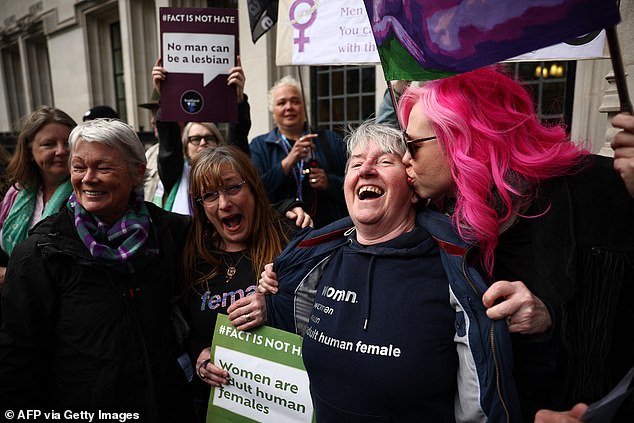
Crowds of people cheered and broke into song after the ruling was handed down
‘They’re able to separate men and women out. If we lost the category of women in the Equality Act, we’d have completely lost that biological distinction in the eyes of the law.
When asked about single-sex spaces such as public toilets and hospital wards, she said: ‘This is a complex area that is going to need to be further worked out by lawyers.
‘We know for a fact that under this ruling, hospitals that want to be single sex can now exclude men, that toilets that want to be single sex can exclude.
‘We don’t know exactly what would have happened under the other ruling, but this provides a safeguard for all single sex spaces if they want to use it.
‘You can’t force a hospital to want to be single sex. You can’t force a bathroom, but if they want to, they now have a legal right to be single sex.
When asked if there was a consequence to denying a biological man access to a woman’s toilet, she said: ‘This ruling makes it legal to do that, so I guess that is the big consequence.
‘This ruling makes it legal for any space that wants to be single sex to exclude biological men.
‘Employers, government officials, healthcare workers, they now all know the case that’s in line with the law, so they have clear guidance, which is very helpful.’
Jo Moseley, an employment law specialist at national law firm Irwin Mitchell, said the decision will make it ‘easier for employers to understand rules around providing single sex and separate sex services’.
She added: ‘It will also mean that employers will be able to understand the correct comparator in sex discrimination and sexual orientation claims and take positive action to support women to progress at work.’
Phillip Pepper, employment partner at law firm, Shakespeare Martineau, said: ‘In the short-term this ruling has the power to create further division and increase tensions.
‘However, it will offer long-term clarity for businesses which have been left to interpret ambiguous, contradictory legislation on their own until this point, potentially landing in hot water as a result.’
Jonathan Mansfield, Employment Law partner at law firm Spencer West LLP, said: ‘Employers will welcome any clarity on the single sex spaces that are afforded to staff. The ruling may strengthen the legal case of those who restrict access to single sex spaces based on biological sex.
‘However, the rights of those who have undergone gender re-assignment not to suffer detriment will have to be borne in mind and employers still face a difficult balancing act.
‘Practical solutions such as lockable gender-neutral cubicles including toilets and handwashing facilities may assist but the issue will still need to be handled with great sensitivity. Legislative clarification would benefit.’
Could employers still be at risk of discrimination?
In short, yes. The Supreme Court made it clear that trans people are protected under the gender reassignment provisions in the Equality Act and will be able to bring claims if they are discriminated or harassed.
Rob McKellar, Legal Services Director at Peninsula, said: ‘The main takeaway here for employers is that although this ruling has confirmed that in the Equality Act 2010 the words ‘woman’ and ‘sex’ refer to biological sex, transgender people are still protected under the Act.
‘The ruling does not change the fact that employers should strive to provide an inclusive workplace that embraces and welcomes all individuals, regardless of any protected characteristics, and failure to do so could result in a discrimination claim at tribunal.’
Ms Moseley said: ‘It doesn’t leave trans people without protection. A trans woman will be able to bring a sex discrimination claim if they are disadvantaged because they are perceived to be a woman or because they associate with a woman.

The Scottish government argued that such people are entitled to sex-based protections, while campaign group FWS claimed they only apply to people that are born female
‘Similarly, a man who identifies as a woman who is treated less favourably because of the protected characteristic of gender reassignment, will be able to claim on that basis.
‘Ultimately this decision gives employers much needed legal certainty and will help them to make legally compliant decisions.’
Mr Pepper added: ‘The Equality Act urgently needs to be updated to ensure that transgender individuals don’t lose any of the protections they currently have from discrimination, and prevent potential inequality of treatment that may occur as a result of this judgement.
‘Whilst that process is ongoing, employers should take extra care to ensure that transgender employees feel safe, represented and valued in the workplace.
‘Employers may have to rethink their policy towards single-sex spaces in the workplace, such as bathrooms and changing rooms, and ensure that all individuals have a suitable space that they feel comfortable in when needing to use those facilities.
‘Some workplaces have become divided on the issue, which means communication, training and zero tolerance on bullying will be vital to ensure that transgender employees do not feel uncomfortable at work.
‘While this decision will be disappointing for some, it ultimately offers a clear path forward for employers who can now ensure they stay on the right side of law.’
What does the ruling mean for competitive sports?
In recent years, many sports have cracked down on rules around transgender athletes at the elite level.
Athletics, cycling and aquatics are among those who have banned trans women from taking part in women’s events.
Earlier this month, the English Football Association introduced stricter rules, but will allow trans women to continue to compete in women’s sport as long as their testosterone is kept below a certain level.
The UK government said it hopes the decision will provide clarity for sports clubs.
Although today’s ruling did not concern sport directly, former Olympian Sharron Davies welcomed the decision.

Pictured: Olympian Sharron Davies who has been vocal on banning trans athletes from female competitions
Ms Davies, who has been vocal on banning trans athletes from female competitions, told the BBC: ‘I think it’s just really important that we can define what a woman is.’
She added: ‘It doesn’t mean to say that we can’t respect people across the whole of society, however they wish to present themselves. My position was always one that, biologically, women are very different from men.’
British Triathlon became the first British sporting body to create an open category for trans athletes in 2022.
Could a pregnant woman with a GRC be entitled to maternity leave?
When FWS’s legal argument was published ahead of the appeal in November, director Trina Budge said: ‘The ramifications of this case are much more far-reaching and all sex-based rights protected by the Equality Act are at risk.
‘The stakes are high and the court’s decision will have consequences for everyday, single-sex services such as toilets and hospital wards.
‘It will determine whether a pregnant woman with a GRC is entitled to maternity leave, what it means to be same-sex attracted, and whether a man with a GRC’s entitlement to join a group of lesbians takes priority over their right to freely associate with only women.
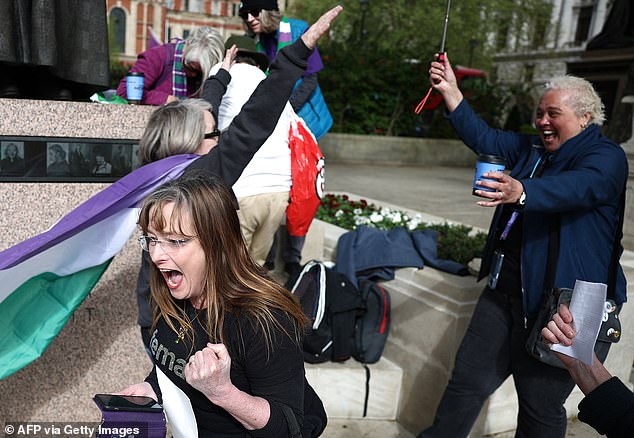
Activists celebrate after hearing the outcome of the Supreme Court’s ruling on how to define a ‘woman’
‘Trans rights are protected under the separate category of gender reassignment but, to fully guarantee women’s rights, it is increasingly clear that a consistent, biological and factual understanding of sex is the only workable solution.’
In a verbal summary, Lord Hodge told the court: ‘Interpreting sex as certificated sex would cut across the definitions of man and woman in the Equality Act and thus the protected characteristic of sex in an incoherent way. It would create heterogeneous groupings.
‘As a matter of ordinary language, the provisions relating to sex discrimination, and especially those relating to pregnancy and maternity and to protection from risks specifically affecting women, can only be interpreted as referring to biological sex.’
Experts said today that the verdict shows a trans man (biological woman) would be able to take maternity leave, while a trans woman (biological man) would not.
Ms Moseley said: ‘The Supreme Court acknowledged that only women can become pregnant. Therefore a trans man (a biological woman who identifies as a man) can take maternity leave.
‘Had the court reached a different decision, it’s possible that trans men with a GRC wouldn’t have been entitled to protection in relation to pregnancy under the characteristics of ‘pregnancy or maternity’.’
How did JK Rowling react?
Harry Potter author JK Rowling is one of the most prominent gender-critical campaigners.
She posted on X today: ‘It took three extraordinary, tenacious Scottish women with an army behind them to get this case heard by the Supreme Court and, in winning, they’ve protected the rights of women and girls across the UK.
‘@ForWomenScot, I’m so proud to know you.’
The critically-acclaimed author later added: ‘Trans people have lost zero rights today, although I don’t doubt some (not t all) will be furious that the Supreme Court upheld women’s sex-based rights.’






